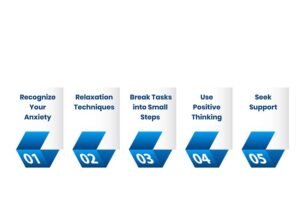Have you ever been stressed or feared something that has not yet taken place? This uncomfortable feeling is known as anticipatory anxiety. It occurs when your head is on what if situations and thinks of problems before they happen. Autistic individuals or highly sensitive to change usually feel it more, yet anyone can experience it. Anticipatory anxiety may cause daily routine activities, socialization, and even basic chores to be overwhelming.
This can be manifested by the beating of your heart racing, tightening of the muscles or difficulty sleeping, which is an early indication that your brain is already set up to experience a stressful situation. The first step of managing anticipatory anxiety is to understand it. By using the effective methods such as relaxation drills, you will be able to worry less and approach the future with more confidence and peacefulness.
What Is Anticipatory Anxiety?
The high level of worry or fear that people experience as a result of a stressful or uncertain event before it occurs is called anticipatory anxiety. It is the what-if type of anxiety, when you are always picturing the worst-case scenarios on something that does not even happen yet. As an illustration, you can be anxious few days before delivering a speech, attending a gathering with a doctor, or meeting someone new. Anxiety usually has a physical effect such as the heart beating fast; you may sweat or have difficulty sleeping since your body has already responded to the danger as a reality.
The form of anxiety can cause difficulty in being in the present and may cause you to sidestep some situations. Nevertheless, one should bear in mind that anticipatory anxiety is not something out of this world but can be improved. These feelings can be decreased by learning relaxation therapy, challenging negative thinking and mindfulness. Through appropriate support and in some cases by use of medication, the individuals would be able to take back control and approach future situations more confidently.
Anticipatory Anxiety Symptoms
Here are the signs for anticipatory anxiety:
- A worry about the future or potential occurrences.
- Difficulty in sleeping or sleeplessness before an event.
- Hastened pulse, perspiration or shaking.
- Being tense, nervous or feeling uneasy.
- Problem with attention or concentration.
- Nausea, abdominal pain, or anorexia.
- Ruminating and thinking of the worst-case scenarios.
- Eschewing fear or stress provoking situations.
What Causes Anticipatory Anxiety?
- The fear of something unknown or the fear of events to come.
- Social events, such as talking to strangers or giving a speech.
- Adaptations to routine or encounter with unforeseen life situations.
- Super-sensitivity to sensory stimuli, e.g. loud noise or bright light.
- Compulsion to act or perform according to self or others.
- Concerns of possible errors or fear of not accomplishing tasks.
- Individual or medical reasons concerning what can and will occur.
- Ruminating on potential consequences of basic or mundane events.
- Fearing reproach or condemnation by the family, friends or peers.
- Feeling powerful emotions which are difficult to control.
- Problem in anticipating the actions of others in social contexts.
- Past trauma or stressful experiences that leave one in dread of it.
Anticipatory Anxiety Autism
Anticipatory anxiety is when one is fearful or anxious about something that could occur in the future. In the case of children or adults with autism. It may occur before some events such as attending school, new acquaintances or new activities. The thoughts of their mind can be preoccupied with what if which in turn makes their body feel tense, their heart beat faster and even cannot sleep. This worry may cause them to be tense before the situation sets in.
Autistic people can exhibit anticipatory anxiety in various forms. They may shun some activities, be easily irritated or repeat some activities to feel secure. These can be assisted by the parents, teachers, or caregivers by establishing bright routines, warning before the changes, and dividing tasks into smaller parts. Getting to know them and helping them feel comfortable may ease their anxiety and enable them to cope with their emotions in a more relaxed manner.
How To Deal with Anticipatory Anxiety?
Anticipatory anxiety begins with learning about your emotions. Attempt to become aware when you start worrying and label it. Slow, deep breathing or doing simple relaxation exercises can help relax your body. Tasks or events become less frightening once they are divided into smaller steps that are easy to manage. Planning and getting things organized beforehand may make you feel more in control and less stressed out.
It is also useful to discuss your concerns with someone you can rely on, such as your parent, a friend, or a caregiver. By telling them how you feel, you can make them smaller. Routines and activities such as visiting a dentist are more comfortable and are especially more comforting to people with autism. In the long run, when one confronts a situation, one might gradually face then this may be easy to manage, and may lessen anxiety in future.
How To Stop Anticipatory Anxiety?

1. Recognize Your Anxiety
The initial process of preventing anticipatory anxiety is to become aware of its beginning. Monitor physical symptoms such as rapid heart rate, the tightness of muscles or insomnia. Identify the thoughts that cause you worry about the things that will happen in the future. By putting them down in writing you can see them. When you know what you are anxious about it becomes easier to deal with.
2. Relaxation Techniques
Relaxation strategies help to relax the body and mind. Tension can be brought down by doing deep breathing, stretching or guided meditation. A difference can be made even by spending a couple of minutes in such exercises every day. The application of these methods before the stressful event allows one to avoid the accumulation of anxiety. Exercising will enhance your calmness.
3. Break Tasks into Small Steps
Big or new tasks may be overwhelming and stressful. Break them down into small manageable steps which you can do one step at a time. Concentrate on completing one task rather than the entire task. This is a way that challenges are not as daunting. Doing little bits helps gain trust and alleviate stress.
4. Use Positive Thinking
Replenish negative thoughts of what if with positive or realistic thoughts. Keep in mind that you can cope with challenges and that being wrong is a part of learning. Imagine the results rather than the dread of failure. Positive thinking alters your mind to respond to stress. It assists in alleviating anxiety and confidence in oneself.
5. Seek Support
A simple conversation with an individual who you can rely on can do wonders. Parents, friends or caregivers may provide comfort, advice, and reassurance. Having support makes you feel not so lonely. They could also assist you to plan and deal with stressful situations step by step. Consistency helps you to overcome anxiety in the long run.
End Note
Anticipatory anxiety is the worry or fear about future events, and it can affect daily life, especially for people with autism or high sensitivity to change. Recognizing the signs early, such as tense muscles, racing thoughts, or avoidance behaviors, is the first step in managing it.
Treatment options include relaxation techniques, breaking tasks into smaller steps, positive thinking, and seeking support from trusted individuals. In some cases, professional help through medication may be recommended to reduce intense anxiety and improve coping.
Mental Behavioral providing guidance, structured routines, and medication management. With proper support and treatment, individuals can manage their anxiety effectively and face future situations with confidence and calmness.
FAQs
What is anticipatory anxiety?
Anticipatory anxiety is the feeling of worry or fear about events that might happen in the future. It often causes physical tension, racing thoughts, or avoidance behaviors.
Who can experience anticipatory anxiety?
Anyone can experience it, but it is common in people with autism, high sensitivity to change, or a history of stressful experiences.
What triggers anticipatory anxiety?
Triggers include uncertainty, changes in routine, social situations, performance pressure, and past negative experiences.
How can I manage anticipatory anxiety?
Techniques like deep breathing, breaking tasks into steps, positive thinking, and seeking support can help reduce anxiety.
Can medication help?
Yes, in some cases, medication prescribed by a professional can reduce intense anxiety and support daily functioning.
How can Mental Behavioral help?
Mental Behavioral provides structured support, guidance, and medication management to help individuals manage anticipatory anxiety effectively.








